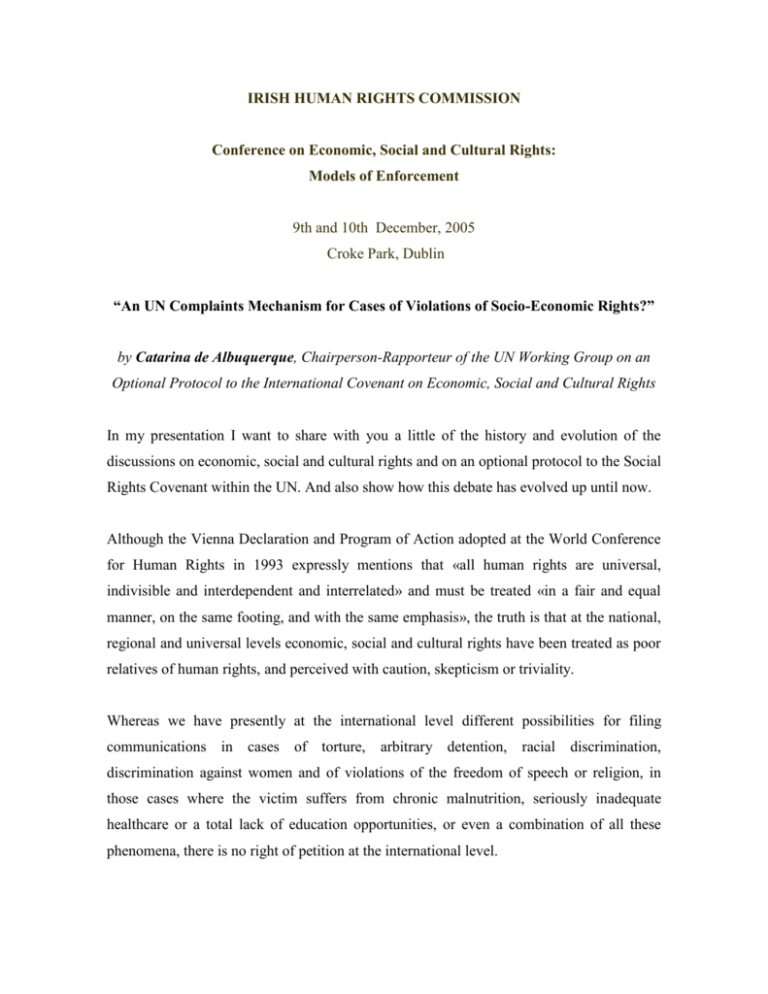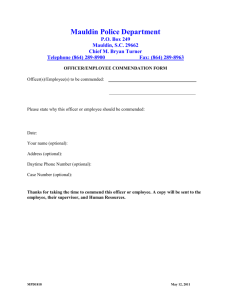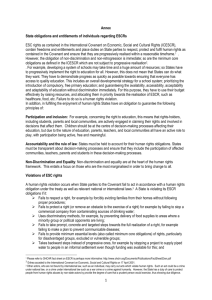Publication in doc format - Irish Human Rights & Equality Commission
advertisement

IRISH HUMAN RIGHTS COMMISSION Conference on Economic, Social and Cultural Rights: Models of Enforcement 9th and 10th December, 2005 Croke Park, Dublin “An UN Complaints Mechanism for Cases of Violations of Socio-Economic Rights?” by Catarina de Albuquerque, Chairperson-Rapporteur of the UN Working Group on an Optional Protocol to the International Covenant on Economic, Social and Cultural Rights In my presentation I want to share with you a little of the history and evolution of the discussions on economic, social and cultural rights and on an optional protocol to the Social Rights Covenant within the UN. And also show how this debate has evolved up until now. Although the Vienna Declaration and Program of Action adopted at the World Conference for Human Rights in 1993 expressly mentions that «all human rights are universal, indivisible and interdependent and interrelated» and must be treated «in a fair and equal manner, on the same footing, and with the same emphasis», the truth is that at the national, regional and universal levels economic, social and cultural rights have been treated as poor relatives of human rights, and perceived with caution, skepticism or triviality. Whereas we have presently at the international level different possibilities for filing communications in cases of torture, arbitrary detention, racial discrimination, discrimination against women and of violations of the freedom of speech or religion, in those cases where the victim suffers from chronic malnutrition, seriously inadequate healthcare or a total lack of education opportunities, or even a combination of all these phenomena, there is no right of petition at the international level. “An UN Complaints Mechanism for Cases of Violations of Socio-Economic Rights?” by Catarina de Albuquerque As was stated by the then Chairperson of the Committee on Economic, Social and Cultural Rights during the Vienna Conference in 1993, the sad reality is that we continue to [quote] «tolerate all too often breaches of economic, social and cultural rights which, if they were committed against civil and political rights, would provoke expressions of horror and outrage and would lead to concerted calls for immediate remedial action. In effect, despite the rhetoric, violations of civil and political rights, continue to be treated as though they were far more serious, and more patently intolerable, than massive and direct denials of economic, social and cultural rights.»1 [unquote]. This statement is over 10 years old, but unfortunately its content remains real. And, in fact, the figures in this regard are striking and devastating: more than 10 million children die each year before their fifth birthday. Every two minutes four people die from malaria alone, three of them children. According to the 2005 World Development Report, “most of these deaths could be prevented by simple, low-cost interventions. Vaccine preventable illnesses—like measles, diphtheria and tetanus—account for another 2–3 million childhood deaths. For every child who dies, millions more will fall sick or miss school, trapped in a vicious circle that links poor health in childhood to poverty in adulthood. … 500,000 women … die each year of pregnancy related causes, and more than 98% of children who die each year live in poor countries. They die because of where they are born. … One in five people in the world—more than 1 billion people—still survive on less than $1 a day … Another 1.5 billion people live on $1–$2 a day. … More than 850 million people, including one in three preschool children, are still trapped in a vicious cycle of malnutrition and its effects. …» Unfortunately, I could continue giving examples of these shocking cases of contrasts and disparities that characterize the world we live in. These inequalities are, in fact, referred to by the High Commission of Human Rights in her Plan of Action, where she mentions that «the gap between rich and poor countries, and 1 A/CONF.157/PC/62/add.5, § 5. 2 “An UN Complaints Mechanism for Cases of Violations of Socio-Economic Rights?” by Catarina de Albuquerque the global inequities it points to, seriously challenge our commitment to the universality of human rights. In human rights terms, poverty is both a symptom and a cause: continuing severe deprivation is a sign that those affected are living in a state of indignity, and thus denial of rights, and the poor and marginalized are deprived, above all, of the capacity to claim their rights. A marked characteristic of virtually all communities living in extreme poverty is that they do not have access, on equal terms, to the institutions and services of Government that give effect to human rights. This inequality of access, in particular to justice, is often linked to discrimination on other grounds.» (see para 10 A/59/2005/Add.3). Later in the Plan of Action, the High Commissioner recognizes that «economic, social and cultural rights still enjoy a lesser status in law in most countries. Some believe that the principle of progressive realization of these rights creates special difficulties regarding accountability. … Much work remains to be done, however, including in convincing often skeptical publics and Governments that human rights truly are interdependent and indivisible.2» The situations I referred to from UNDP’s report mirror cases where the realization of socioeconomic rights is still and only a mirage for millions – or even billions – of persons. A better implementation and realization of economic, social and cultural rights in the world passes through acknowledging them as rights. But also treating them on the same footing and with equal emphasis as civil rights. The international community has different tools to address these inequalities of recognition, treatment and enforcement. However, an optional protocol to the ICESCR is one way of moving forward and it is about this process that I intend to devote my intervention – as the process leading to an OP is probably, at the present moment, the focal point for discussions on implementation of ESCR at the international level. 2 See § 78, Plan of action submitted by the United Nations High Commissioner for Human Rights, A/59/2005/Add.3. 3 “An UN Complaints Mechanism for Cases of Violations of Socio-Economic Rights?” by Catarina de Albuquerque But let me first give you an idea of the long process aimed at putting all human rights – civil, cultural, economic, political and social - at the same level and giving them the same legal importance and of the different discussions, reports, drafts and declarations that have been issued on this matter. False Twins With the adoption, in 1966 of the two International Covenants – on Civil and Political and on Economic, Social and Cultural Rights hereinafter referred to as ICESCR or Social Rights Covenant – a gap was formally opened in the international protection of the two sets of rights. Although the two Covenants were adopted on the same day and through a sole General Assembly resolution and even if some of their provisions are equivalent, there are fundamental differences between the two instruments. 1. Firstly, and on the one hand the Social Rights Covenant did not create an independent body for the follow-up and monitoring of the treaty’s enforcement at the national level, whereas the ICCPR foresaw the creation of the Human Rights Committee – a body composed by 18 independent experts and in charge of monitoring the way States Parties fulfill their obligations under that Covenant. The Committee fulfills its functions through the examination of periodic reports submitted by States Parties on the measures they have adopted in order to give effect to the rights recognized in the Civil Rights Covenant and on the progress achieved in the enjoyment of these rights. 4 “An UN Complaints Mechanism for Cases of Violations of Socio-Economic Rights?” by Catarina de Albuquerque The Social Rights Covenant consecrates rather ECOSOC’s competence for receiving and examining periodic reports presented by States Parties as we know, ECOSCO is a subsidiary body of the General Assembly, with a political nature and where UN Member States are represented. However, due to the inefficacity of this monitoring and follow-up procedure by an ECOSOC Working Group with a political character, the Committee on Economic, Social and Cultural Rights hereinafter referred to as CESCR or Social Rights Committee–as we know it today - was created in 1985 through an ECOSOC resolution. The Committee is composed by independent experts and has the functions of monitoring and examining States Parties reports – exactly like any other treaty monitoring body within the UN human rights system. The Committee met for the first time in 1987 and has, since then, developed an important work in the examination of States parties’ reports and in the elaboration of general comments on certain Covenant rights. 2. Secondly, and contrary to what happened in relation with the ICCPR, no mechanism for the presentation of communications of alleged violations of social rights was created in relation to the ICESCR. In fact, the Optional Protocol to the ICCPR «recognizes the competence of the Committee to receive and consider communications from individuals subject to its jurisdiction who claim to be victims of a violation by that State Party of any of the rights set forth in the Covenant» (see article 1). Crossing the desert Although, in practical terms, a greater attention was devoted to civil and political rights than to economic, social and cultural rights, almost since the adoption of the two Covenants a long process started with a view to re-establishing an equality between both sets of rights, namely through the discussions related to the need to ensure that the ICESCR be granted a communications mechanism. Discussions started – also influenced by the positive experience witnessed within the Human Rights Committee – on the importance of the examination of specific cases by the treaty monitoring body, namely through a communications procedure. 5 “An UN Complaints Mechanism for Cases of Violations of Socio-Economic Rights?” by Catarina de Albuquerque So, in 1991 – only four years since it started to work, but already 15 years ago – the Committee on Economic, Social and Cultural Rights initiated the debate on the possibility of drafting an optional protocol to the Covenant. One year later, in 1992, the Special Rapporteur on the “Realization of Economic, Social and Cultural Rights” Danilo Türk, recommended that « accent … be placed by the United Nations on developing means to monitor consistently and reliably violations of economic, social and cultural rights»3 The Expert also recommended that the Committee on Economic, Social and Cultural Rights pursue its work on this issue with a view to «Discuss further the exigencies of the eventual adoption of such an optional protocol to the Covenant on Economic, Social and Cultural Rights;»4 That same year, the Committee on Economic, Social and Cultural Rights prepared an Analytical Paper entitled “Towards an Optional Protocol to the International Covenant on Economic, Social and Cultural Rights” which it submitted to the Preparatory Committee of the Vienna World Human Rights Conference. The Committee explained therein that «a system for the examination of individual cases offers the only real hope that the international community will be able to move towards the development of a significant body of jurisprudence in this field. As the experience of the Human Rights Committee demonstrates, such a development is essential if economic, social and cultural rights are to be treated as seriously as they deserve to be.»5 3 E/CN.4/Sub.2/1992/16, para 182. E/CN.4/Sub.2/1992/16, para 211. 5 A/CONF.157/PC/62/add.5, §93 and 94. 4 6 “An UN Complaints Mechanism for Cases of Violations of Socio-Economic Rights?” by Catarina de Albuquerque In a statement made in June 1993 during the Vienna Conference, the Committee remarked that there are strong reasons in favor of the adoption of a complaints mechanism to the ICESCR, which should be fully optional and allow for the presentation of communications from individuals or groups who are alleged victims of violations of Covenant rights. 6 On the basis of these and other documents, the World Conference on Human Rights adopted the VDPA, which reaffirms, as I have already mentioned, that all human rights are universal, indivisible and interdependent. The Declaration also encourages the Commission on Human Rights «in cooperation with the Committee on Economic, Social and Cultural Rights, to continue the examination of optional protocols to the International Covenant on Economic, Social and Cultural Rights»7. It is interesting to note that, although the VDPA refers to protocols (in the plural), the sole proposal submitted to the Conference dealt uniquely with an optional protocol foreseeing a communications system – it was the proposal that had been submitted by the Social Rights Committee. Three years later, in 1996, the Committee on ESC finalized its draft Optional Protocol, which it submitted to the Commission on Human Rights in 1997. The draft suggests the creation of a mechanism for the exam of individual communications or complaints related to cases where States Parties have violated their legal obligations under the Social Rights Covenant. According to the draft, the Social Rights Committee should be competent to receive communications. The majority of the Committee members 6 Idem, Annex I, §18. 7 Vienna Declaration and Programme of Action, Adopted by the World Conference on Human Rights in Vienna on 25 June 1993, §75/II. 7 “An UN Complaints Mechanism for Cases of Violations of Socio-Economic Rights?” by Catarina de Albuquerque also expressed a clear preference for a comprehensive approach, which would enable presenting communications in cases of alleged violations of any of the rights consecrated in the Covenant8. The text also contains several rules on the admissibility conditions for the presentation of a communication, but contemplates no provisions on inquiry procedures nor on inter-state complains. For four years – between 1998 and 2001 - governments and several organizations submitted comments to the draft. Only a very limited number of governments did so: Canada, Croatia, Cyprus, Czech Republic, Ecuador, Finland, Georgia, Germany, Lebanon, Lithuania, Mauritius, Mexico, Norway, Portugal, Sweden and Syrian Arab Republic. In 2001 – 5 years after the Committee had finalized its draft and 10 years after it had started discussions on an optional protocol - the Commission on Human Rights, through resolution 2001/30, appointed an Independent Expert on the Question of an Optional Protocol to the International Covenant on Economic, Social and Cultural Rights and requested him to present a report to the 58th session of the CHR – that would take place in 2002. Some months after the 57th session of the CHR, on the 15th August 2001, the Sub-Commission for the Promotion and Protection of Human Rights9, adopted a resolution stating that an openended working group of the Commission on Human Rights would be the appropriate mechanism to examine the question of a legally binding instrument as the draft optional protocol to the ICESCR. Therefore, the Sub-Commission urged the Commission on Human Rights to establish an open-ended working group with the aim of continuing the examination of an optional protocol to the ICESCR. In 2002, the Independent Expert presented his report to the Commission on Human Rights hereinafter referred to as CHR where he suggested that: 1. The Commission on Human Rights confirm State’s solemn engagement in relation to the possible adoption of an optional protocol to the ICESCR. 8 9 E/CN.4/1997/105. See resolution 2001/16. 8 “An UN Complaints Mechanism for Cases of Violations of Socio-Economic Rights?” by Catarina de Albuquerque 2. That a Working Group not be immediately created, since the subject still created many doubts, uncertainties and even the opposition from several States; 3. That his mandate be renewed. So, and following these recommendations, in 2002 the Expert’s mandate was renewed for one more year and he was again requested to present another report to CHR’s following session. The Expert was asked to study in greater depth some questions which were linked with the nature and scope of States Parties obligations under the Covenant, the question of justiciability of economic, social and cultural rights, as well as the question of benefits of a communication mechanism. Also in 2002, the CHR decided to establish in the following year, in 2003, an open-ended working group with a view to study options regarding the elaboration of an Optional Protocol to the ICESCR. The decision to establish the WG only one year later – and not immediately in 2002 – was justified because of the IE’s recommendations that it not be immediately created. Many States favoring an Optional Protocol were strongly opposed to the decision of postponing the WG’s creation. However, it was possible to adopt the resolution without a vote – which demonstrates that this was perhaps the wisest way to move forward. In his second report of 200310 the Independent Expert concludes that «the adoption of a draft optional protocol to the International Covenant on Economic, Social and Cultural Rights would, no doubt, contribute to the efforts to promote, in accordance with the principles contained in the Charter of the United Nations, “recognition of the inherent human dignity and of the equal and inalienable rights of all members of the human family [which] is the foundation of freedom, justice and peace in the world”» An in his report’s final paragraph he recommends the « Commission on Human Rights to adopt a resolution in which it confirms the decision contained in its resolution 2002/24, … and to establish … an open-ended working group of the Commission with a view to 10 E/CN.4/2003/53. 9 “An UN Complaints Mechanism for Cases of Violations of Socio-Economic Rights?” by Catarina de Albuquerque considering options regarding the elaboration of an optional protocol to the International Covenant on Economic, Social and Cultural Rights …». Therefore, on 22nd April 2003 the CHR adopted resolution 2003/18, which decided to establish the working group. The Commission on Human Rights’ Working Group (WG) The WG has met twice, namely in February 2004 and January 2005. It counted with the presence of several human rights experts, members of treaty monitoring bodies, of the ILO, UNESCO, African and European Human Rights systems. In the WG’s latest session the High Commissioner for Human Rights addressed the Group and mentioned that «a petition system at the international level can help provide guidance for the reasonable interpretation of universal norms in the provision of remedies at the domestic level. … It can also serve to establish if there is already the effective or appropriate implementation of existing laws and policies, rather than to determine the reasonableness of such laws and policies.» In the last session of the Working Group – at the beginning at this year – Member States asked me to prepare an analytical paper containing elements for an Optional Protocol to the ICESCR « in order to facilitate a more focused discussion at the third session of the working group». I have just finalized drafting the analytical paper. During the process of preparing it I convened an experts’ meeting in Cascais in order to discuss the paper’s first draft. I counted with the invaluable input from experts coming from different regions of the world like Philip Alston (Australia), Victor Dankwa (Ghana), Paula Escarameia (Portugal), Kamal Houssein (Bangladesh), Mónica Pinto (Argentina), Martin Scheinin (Finland). Three members of the Committee on ESCR - Virgínia Brás Gomes, Giorgio Malinverni and Eibe Riedel - also participated in the consultation or gave written comments on the paper’s draft. 10 “An UN Complaints Mechanism for Cases of Violations of Socio-Economic Rights?” by Catarina de Albuquerque The analytical paper is already available on the Office of the High Commissioner for HR’s website in order for interested delegations to have the necessary time to analyze it. I am not impartial when talking about it, but I hope it will contribute to deepen and focus the discussions, and also to dissipate some clouds and drive away some phantoms that were levitating over the working group’s discussions. The Elements Paper is divided into four Parts: the first deals with a communications procedure (including with the question of The scope of rights subject to a communications procedure, Admissibility criteria, Standing, Proceedings on the merits, Interim measures, Views and recommendations; Follow-up to decisions and recommendations and Reservations). Part II deals with an inquiry procedure and Part III with an inter-state procedure. Finally, Part IV handles cross-cutting issues, such as an optional protocol and domestic decisions on resource allocation, the relationship of an optional protocol with existing mechanisms, the analysis and assessment of the impact of an optional protocol on improving implementation of economic, social and cultural rights at the national level, the option of having no optional protocol, international cooperation and assistance and the costs of an optional protocol. It identifies some questions that the WG should answer to, some decisions that have to be made in view of drafting an optional protocol and in some cases gives hints on possible solutions for agreement to be reached on certain issues. The Program of Work of the WG’s next session has been preliminarily adopted in Geneva one month ago and therefore the next session will be devoted to discussing the elements paper. Besides that we will also count with the presence of a representative from the InterAmerican Human Rights system, in order to enable us to better get acquainted with it. To conclude I would like to mention that discussions on an optional protocol, as well as on the Working Group’s future mandate are at a crucial point. The next session of the Working Group – between the 6th and the 17th of February 2006, at a time the International Covenant 11 “An UN Complaints Mechanism for Cases of Violations of Socio-Economic Rights?” by Catarina de Albuquerque becomes 40 years old and the draft optional protocol prepared by the Committee becomes a teenager – will be crucial and I hope that it will enable us to move forward. An optional protocol to the ICESCR will not solve all the problems of the world, but it can surely contribute to improving the enjoyment of socio-economic rights at the domestic level – Simon Walker’s intervention will point at examples of how this can happen. However an optional protocol will definitely recognize the legitimacy and dignity of victims of violations of social rights to be listened to and give renewed hope to the millions of human beings who still do not enjoy the rights recognized in the Covenant. Thank you for your attention. 12




